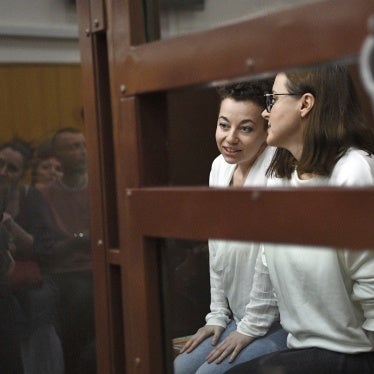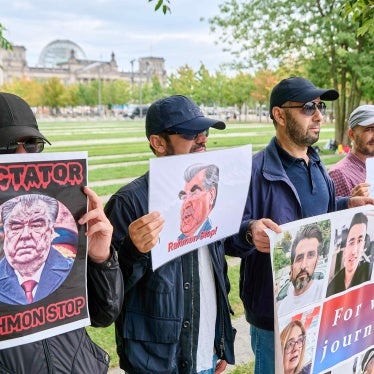We are writing on behalf of Human Rights Watch and the American Civil Liberties Union (ACLU) to express concern about the U.S. government’s stated intention to pursue “diplomatic assurances” from the government of Uzbekistan in order to remove an Uzbeki national, Bekhzod Yusupov, who has been granted deferral of removal under the Convention against Torture (“CAT”). Any diplomatic assurances against torture and ill-treatment from the government of Uzbekistan would be inherently unreliable and would violate U.S. obligations under CAT.
In August 2005, the Board of Immigration Appeals (BIA) held that Mr. Yusupov, an independent Muslim (a person who practices Islam outside state institutions and guidelines), was legally entitled to deferral of removal pursuant to the U.S. government’s obligations under CAT. Recognizing that the record was “replete” with evidence of the Uzbek government’s routine use of torture, the BIA held that Mr. Yusupov “more likely than not” would be tortured if returned to Uzbekistan.
Mr. Yusupov is currently being detained by U.S. Immigration and Customs Enforcement (“ICE”) in Pike County Prison, Pennsylvania. In a July 19, 2006 “Decision to Continue Detention” letter, ICE informed Mr. Yusupov that “ICE is pursuing assurances from the government of Uzbekistan” that he would not be tortured upon return. The letter concluded that there is a “significant likelihood” of Mr. Yusupov’s removal “in the reasonably foreseeable future” in light of the attempt to secure such assurances, and that he would remain in detention until such time as the assurances were received.
Human Rights Watch and the ACLU are dismayed and concerned that the U.S. government would seek and attempt to secure diplomatic assurances from Uzbekistan, a state that is notorious for practicing systematic torture.
The Uzbek government’s use of torture is well-documented not only by nongovernmental organizations such as Human Rights Watch, but also by the State Department, which found in its 2005 Country Report on Human Rights Practices that Uzbek authorities “routinely tortured, beat, and otherwise mistreated detainees to obtain confessions or incriminating information.” Other respected international experts have also found a consistent pattern of torture. In 2003, following a visit to Uzbekistan, the then-U.N. Special Rapporteur on Torture concluded that “torture and similar ill-treatment is systematic,” that it was “condoned, if not encouraged,” by senior authorities, and that it occurred with impunity. More recently, in an April 10, 2006 interview on Radio Free Europe/Radio Liberty, the current Special Rapporteur on Torture said that “there is ample evidence that both police and other security forces have been and are continuing to systematically practice torture, in particular against dissidents and people who are opponents of the regime.” Methods of torture in Uzbekistan include beatings with truncheons, electric shock, hanging people by their wrists or ankles, rape and sexual humiliation, asphyxiation with plastic bags and gas masks, and threats of physical harm to relatives.
Uzbek law enforcement officers also continue to round-up and torture independent Muslims like Mr. Yusupov who are followers of Imam Nazarov. Imam Ruhiddin Fakhruddinov, a well-known associate of Imam Nazarov, was detained and physically abused in custody after Kazakh authorities forcibly and illegally returned him from Kazakhstan to Uzbekistan in November 2005.
It is routine for the Uzbek authorities to charge and detain political and religious dissidents (including refugees who fled the country after the May 2005 massacre in Andijan) with supporting “illegal religious movements.” Recognizing the high risk of torture and other ill-treatment faced by dissidents charged with supporting “illegal religious movements” in Uzbekistan, the U.S. State Department has urged other governments not to give in to Uzbek demands to repatriate such dissidents. Nevertheless, ICE claims that it is seeking diplomatic assurances to accomplish repatriation in Mr. Yusupov’s case.
There is no basis upon which to trust diplomatic assurances against torture from the Uzbek authorities, who routinely deny that their agents employ torture. Government assurances of humane treatment for one specific person cannot be considered credible when the same government routinely flouts its international obligations not to engage in torture and denies that it does so. Indeed, the pervasiveness of torture in Uzbekistan means that even if the government were to give assurances against torture in good faith, which it manifestly cannot, it would be incapable of honoring them.
Diplomatic assurances are, as a practical matter, unenforceable, and there is no recourse for a person if the assurances are breached. In fact, the pervasive impunity of officials for torture tends to make one think that there would be less risk of reporting torture, as torture is considered normal. The lack of any credible enforcement of the ban against torture in Uzbekistan makes it unlikely that any person detained there on charges of supporting “illegal religious extremism” would be willing to report torture to Uzbek officials. To do so would be to risk reprisals against the detainee or his or her family members. Even if allegations of torture were made, the lack of political independence on the part of the police and the courts in Uzbekistan, render it unlikely that a credible and comprehensive investigation would ensue.
In the unlikely event that allegations of torture by a detainee were brought to light, neither the Uzbek nor the U.S. government would have any incentive to acknowledge a breach of the diplomatic assurances. To do so would require the U.S. government to admit a violation of its nonrefoulement obligations under U.S. law and the Convention against Torture, and the Uzbek government to acknowledge a violation of the absolute prohibition against torture.
The July 19, 2006 letter from ICE to Mr. Yusupov runs counter to our understanding until now that the U.S. government does not return persons at risk of torture to Uzbekistan, nor does it seek or consider reliable diplomatic assurances from the Uzbek authorities that they will not torture or abuse returnees. Indeed, in the last year, the U.S. government has urged other governments, including Kyrgyzstan, not to return persons at risk of persecution and/or torture to Uzbekistan. On August 24, 2006, the New York Times reported that “the United States is very concerned by reports that two officially registered Uzbek refugees were forcibly removed from their homes in Osh, Kyrgyzstan” and that the U.S. “urged the Kyrgyz government to take immediate steps to ensure the safety and rights of all refugees and asylum-seekers in Kyrgyzstan.”
Human Rights Watch and the ACLU urge the U.S. government to refrain from seeking inherently untrustworthy diplomatic assurances from the Uzbek authorities. We request you to confirm that you will not pursue such assurances from the Uzbekistan government in Mr. Yusupov’s case, or indeed in any other case.
Sincerely,
Holly Cartner
Executive Director
Europe and Central Asia
Human Rights Watch
Lucas Guttentag
Director
Immigrants’ Rights Project
American Civil Liberties Union
cc:
Condoleeza Rice
Secretary of State
U.S. Department of State
2201 C Street NW
Washington, DC 20520
James P. DeHart
Deputy Director
Central Asia Desk
U.S. Department of State
2201 C Street NW
Washington, DC 20520
Michael Chertoff
Secretary
U.S. Department of Homeland Security
Washington, D.C. 20528
Igor Timofeyev
Senior Advisor for Refugee and Asylum Policy
U.S. Department of Homeland Security
Washington, D.C. 20528








